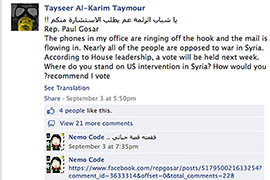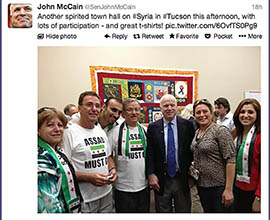Cronkite News has moved to a new home at cronkitenews.azpbs.org. Use this site to search archives from 2011 to May 2015. You can search the new site for current stories.
War of words on war: Social media light up in effort to reach lawmakers
WASHINGTON – Faced with the question of whether to approve U.S. military action against Syria, some Arizona lawmakers used social media this week to pose the question to the public.
And they got answers. Lots of them, from lots of places.
From Tuba City, Ariz., to Tubna, Syria, and from Buckeye to Buq’ata, lawmakers received hundreds and thousands of comments on social media sites that they said typically only draw dozens of comments, even on hot-button issues like immigration.
Just mentioning that he was headed to Washington for a Syria hearing drew more than 250 Facebook comments for Rep. Matt Salmon, R-Mesa. Other members of the state’s delegation said their social media sites have been flooded, on top of the usual calls and letters their offices receive.
“This is an important issue, so a lot of folks are making their voices heard, and that’s important,” said Jennifer Johnson, a spokeswoman for Rep. Ann Kirkpatrick, D-Flagstaff.
Not just a lot of folks, but a lot of folks from different places. The reach of the Internet has allowed comments to pour in from Arizonans as well as, apparently, from Syrians.
When Rep. Kyrsten Sinema, D-Phoenix, created an online poll and said on her Twitter and Facebook accounts “we’d like to know your thoughts,” many of those advocating for U.S. intervention in Syria were nearly identical. Some were signed in Arabic and others signed as “John Smith.” The same was true for many comments to other Arizona lawmakers.
“If you see the same message again and again, those messages probably came from the same place, just from different posters,” said Leslie-Jean Thornton, an Arizona State University journalism professor who specializes in social media. “Groundswell sentiment can be orchestrated as well as spontaneous.”
At least one Facebook group, “English Speakers to Help the Syrian Revolution,” was tracking undecided lawmakers and posting their names and social media accounts, along with suggested wording of posts. The group had linked to both Sinema’s and Rep. Paul Gosar’s requests for public opinions on Syria.
Gosar, a Prescott Republican, asked on Facebook, “How would you recommend I vote?” His Tuesday question had racked up more than 480 comments by Friday. By comparison, an Aug. 24 post on immigration reform drew 32 comments and an Aug. 27 one on border security garnered 25.
While a flood of Internet traffic is impressive, it’s not clear that a comment from around the globe has as much impact for Arizona lawmakers as one from the town of Globe.
“I don’t think it’s affected the impression of the general public” in the U.S., said California State University, Northridge, journalism professor Melissa Wall, of the number of foreign postings.
“They (Americans) may feel sorry for these people, but they don’t want to go to war there,” she said.
Wall has studied the alternative media system in Syria, which relies on avenues like Facebook and YouTube. It lets “citizen journalists” get “direct voices” from inside Syria to broader world with photos and video of the events there, despite attempts by the Syrian government to silence them, she said.
While those claiming to be Syrians tended to urge U.S. action, Gosar said posts from his district “almost unanimously” opposed a strike.
“They’re tired, they don’t trust the information they’ve been given,” said Gosar, who announced this week that he would vote against U.S. military action. “They don’t see what’s the articulated plan here.”
Kirkpatrick’s Facebook link to her statement on Syria had received more than 570 comments by Friday afternoon. Reps. Ron Barber and Raul Grijalva, both Tucson Democrats, had also received hundreds of posts about Syria.
Some lawmakers were deluged with comments even though they had not posted anything about a Syria strike.
The official Facebook page of Rep. Trent Franks, R-Glendale, has seen a growing number of appeals for intervention, many from posters whose names were in Arabic script or who claimed to be from Syria.
Fewer than five visitors a day had been posting to Franks’ Facebook page in late August. It got nine comments on Aug. 31, the day President Barack Obama said he would ask Congress to OK a Syria strike, and 60 posts on Sept. 1, most of those regarding Syria.
Franks has not indicated how he might vote and his office did not return repeated calls seeking comment.
But even those without a social media presence are hearing from constituents.
Rep. Ed Pastor, D-Phoenix, does not have official Twitter or Facebook accounts, but an aide said his office has received many calls on the issue, only a few favoring a strike.
“We’re getting calls – the last time I polled the staff was about two days ago and at that time I think we had 50 to 60 calls, most of them against,” Pastor spokeswoman Maura Cordova said Thursday.
A Gallup poll released Friday said 51 percent of Americans opposed U.S. military action in Syria, while 36 percent favored it. It presents Congress with a tough choice, said Kyle Kondik, managing editor of Larry Sabato’s Crystal Ball, a political analysis website at the University of Virginia Center for Politics.
“It’s sort of public opinion versus the president,” Kondik said.










